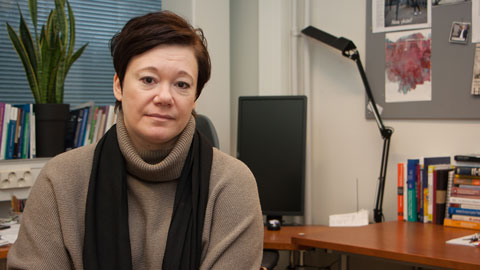Loneliness Can Kill
"Do I even exist?" "I feel like I can't cope with this life." "That nobody notices. Or cares. And that is the worst feeling ever." These are sentences that Niina Junttila, who studies loneliness, meets time and again. Loneliness is a phenomenon that makes people suffer and can even kill.

– According to research, loneliness is a bigger risk factor for premature death than climate change or obesity, says University Research Fellow Niina Junttila quoting American Professor of Neuroscience John Cacioppo.
University Research Fellow Niina Junttila's new book, titled Kavereita nolla, Finnish for zero friends, was published at the end of January. The book is in many ways an eye-opener. It reveals the many forms of loneliness and that it is a serious, widely spread, and even physically damaging issue.
International studies show that loneliness impairs the immune system, increases the risk of cardiovascular diseases and alters the hormone and stress regulation mechanisms in the brain.
Junttila's goal is to bring the topic to public discussion. The response has been powerful.
– We organised a survey together with the Helsingin Sanomat newspaper and we expected only a few hundred responses, maybe a thousand. We received 30,000 responses even though the survey was long and filling it in took time, says Junttila.
The respondents' stories are a rough read. For example, every fourth of the respondents would be willing to reduce their standard of living if they had even one friend. Despite the fact that, according to statistics, the gross income of lonely people is lower than the average income.
Lonely Even in a Group
But what is loneliness? The starting point for understanding it is to accept that loneliness is an entirely subjective experiThe starting point for understanding it is to accept that loneliness is an entirely subjective experience of an individual. A person who is part of a large group can be emotionally very lonely. On the other hand, a person who does not spend much time with people might not experience any loneliness.
The starting point for understanding it is to accept that loneliness is an entirely subjective experiThe starting point for understanding it is to accept that loneliness is an entirely subjective experience of an individual. A person who is part of a large group can be emotionally very lonely. On the other hand, a person who does not spend much time with people might not experience any loneliness.
Being alone is physical, loneliness is psychological. Junttila describes two different forms of loneliness. A person who does not have a group can be socially lonely. A person who is emotionally lonely can be part of even a large group of acquaintances but does not have any close friends who would offer support in the most trying situations in life.
Turku Is a Pioneer in the Research of Loneliness in Children and Youth
Robert Weiss's book on loneliness, published in 1973, is regarded as the foundation of loneliness research. In Finland, the topic started to interest researchers in the 1980s.
Niina Junttila has had an exceptionally long career as a researcher of loneliness. She did her Master's thesis on loneliness and for the first time the research subjects were kindergarten-aged children.
– Up until then it had been thought that loneliness starts bothering children only at school age, but our Professor at the time, Kaarina Laine,wanted to research the topic more closely. There were four of us completing our Master's degree and we went around kindergartens to talk with the staff and the children. We found the same phenomena: bullies, bullied, and lonely, repressed and unsociable children, says Junttila.
The survey of the Helsingin Sanomat newspaper revealed that, in the worst cases, loneliness can follow people around throughout their entire life.
– 32 percent of the 30–60-year-old respondents who characterised themselves as lonely said that they had been lonely already as a child and 56 percent revealed they had been lonely as a teenager, says Junttila.
Compared with average citizens, lonely people are more often unemployed, in debt, and drugs or alcohol. abusers. However, the spiral of loneliness can be stopped.
– For example, when transferring to the secondary school, the first semester is crucial. At that point, we should support the youngsters and discuss the issue especially with the boys, says Junttila.
Text: Erja Hyytiäinen
Photos: Erja Hyytiäinen and Kate Hiscock
Translation: Mari Ratia